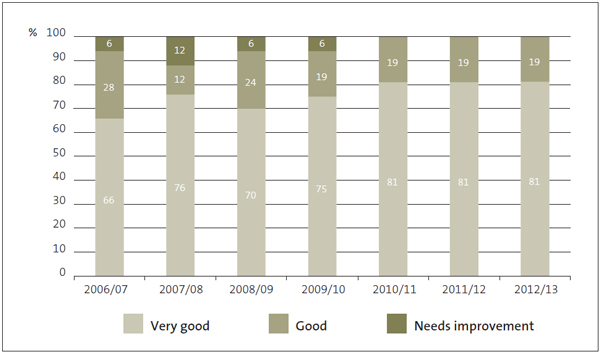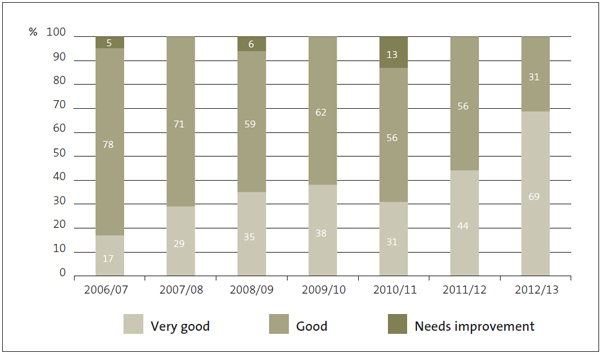Part 2: Results of our annual audits
2.1
In this Part, we set out the results of our annual audits of the companies. For 2012/13, we issued unmodified audit opinions for all 18 of the companies' parent and group accounts.
2.2
We did not audit the companies' overseas subsidiaries because they are not public entities and, therefore, are not within the Auditor-General's audit responsibilities. For example, although we audited the company and group accounts of Kordia, we did not audit the foreign subsidiary companies that constitute a significant proportion of Kordia's business activity.
2.3
Solid Energy New Zealand Limited, Electricity Corporation of New Zealand Limited, and Learning Media Limited received non-standard audit reports. For these entities, our audit report included "emphasis of matter" paragraphs.
2.4
For Solid Energy, we drew readers' attention to the use of the "going concern assumption" in the financial statements. Although the financial statements were prepared under the assumption that Solid Energy is a going concern, there remained uncertainty about capital restructuring, future coal prices, and assumptions used in the cash-flow projections for the Stockton mine.
2.5
Electricity Corporation is winding up its operations. We drew attention to disclosures that refer to the financial statements being appropriately prepared on a "realisation basis".
2.6
The emphasis of matter paragraph in our audit report for Learning Media noted that the financial statements were appropriately prepared on a realisation basis because of the decision to wind up the company and group.
2.7
We issued a modified audit opinion for New Zealand Post Recycled Centre Limited, a subsidiary of New Zealand Post Limited. Limitations in the controls over the subsidiary's revenue meant that we could provide limited assurance about the completeness of the reported revenue.
2.8
The audit reports for five subsidiaries of Solid Energy included emphasis of matter paragraphs that mainly concerned the points noted in paragraph 2.4.
Environment, systems, and controls
2.9
In annual audits, we consider the management control environment as well as the financial information systems and controls that support the managing and reporting of financial information.
2.10
During audits, our appointed auditors assess strengths and deficiencies. Auditors recommend specific improvements to identified deficiencies.
2.11
The companies report a range of information in their annual reports, including reporting against their statement of corporate intent. The companies also provide information on corporate social responsibility and sustainability matters, some of which is reported against international frameworks. The State-Owned Enterprises Act 1986 does not require this additional information to be audited. However, auditors are required to consider the information reported against the statement of corporate intent (in particular, the performance measures and targets) to ensure that it is consistent with other information disclosed in the annual report.
2.12
Our auditors also provide independent assurance about some of the reported information on corporate responsibility and sustainability. This is done at the company's request.
Management control environment
2.13
Comments about a company's controls are based on our observations of many elements. These include:
- clarity of strategic planning;
- organisational structure;
- how ethical values are communicated and applied;
- commitment to competence;
- involvement of those in governance roles;
- management philosophy and operating style;
- assignment of authority and responsibility;
- human resource policy and practices;
- risk assessment and management;
- policies and procedures that provide controls over business processes and monitoring, self-review, and internal audit practices; and
- arrangements to help ensure that the public entity complies with legislation.
2.14
Figure 1 sets out the grades that we assigned to 16 companies in 2012/13.4
Figure 1
Summary of management control environment grades, 2012/13
| Number of companies graded | Management control environment | |||
|---|---|---|---|---|
| Very good | Good | Needs improvement | Poor | |
| 16 | 13 | 3 | 0 | 0 |
2.15
Figure 1 shows that we made recommendations for improvements to the management control environment for three of the 16 companies graded.5 The management control environments for these three companies received "good" grades. This means that we considered that the suggested improvements were not necessary for maintaining a sound management control environment but would be beneficial.
2.16
Figure 2 shows changes in management control environment grades between 2006/07 and 2012/13.
Figure 2
Management control environment grades, 2006/07 to 2012/13

Note: There were 18 companies in 2006/07, 17 in 2007/08 and 2008/09, and 16 from 2009/10 on.
2.17
The most notable feature of Figure 2 is the increase in the percentage of companies receiving a "very good" grade between 2006/07 and 2010/11. In general, grades improved during this four-year period. The percentages have remained stable since 2010/11.
Financial information systems and controls
2.18
Comments and grades for financial information systems and controls are based on our observations of the appropriateness and presentation of financial information, the reliability of financial information systems, and control and monitoring activity.
2.19
Figure 3 sets out the grades we assigned to 16 companies in 2012/13.
Figure 3
Summary of financial information systems and controls grades, 2012/13
| Number of companies graded | Financial information systems and controls | |||
|---|---|---|---|---|
| Very good | Good | Needs improvement | Poor | |
| 16 | 11 | 5 | 0 | 0 |
2.20
As Figure 4 shows, the percentage of companies receiving a "very good" grade for their financial information systems and controls increased between 2006/07 and 2012/13. After intermittent years in which some companies were assigned "needs improvement" grades, all 16 companies have received either "good" or "very good" grades for the last two years.
Figure 4
Financial information systems and controls grades, 2006/07 to 2012/13

Note: There were 18 companies in 2006/07, 17 in 2007/08 and 2008/09, and 16 from 2009/10 on.
4: We did not grade Electricity Corporation and Learning Media because they were being wound up.
5: These were KiwiRail Holdings Limited, Quotable Value Limited, and Solid Energy.

